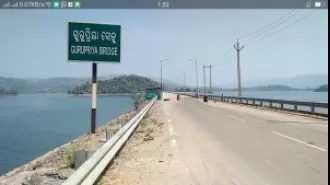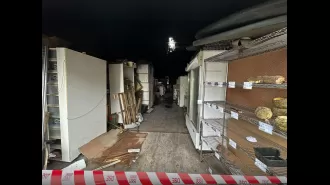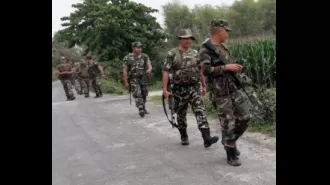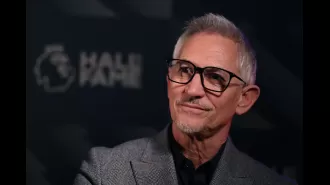Israel attacks Lebanon and Gaza, resulting in dozens of deaths.
Israel bombed Lebanese northeast, killing 45 people and destroying Beirut’s southern suburbs.
November 1st 2024.
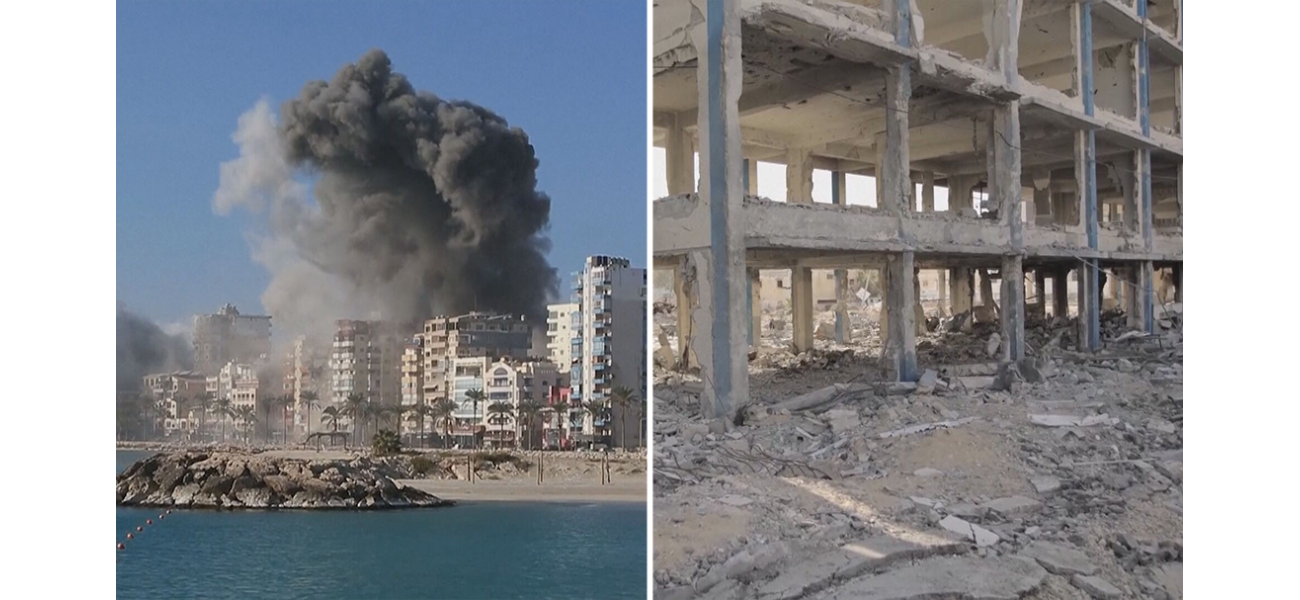
On Friday, authorities reported that Israel had launched a series of airstrikes in Lebanon's northeast, causing the deaths of at least 45 people. The once-bustling neighborhoods in Beirut's southern suburbs were now reduced to smoldering ruins. At the same time, in central Gaza, Palestinians were recovering the bodies of 25 people killed in Israeli attacks that had started the previous day.
According to Israel, the airstrikes were targeted at Hamas infrastructure near the Nuseirat refugee camp. This latest wave of violence comes amid renewed diplomatic efforts by the Biden administration to reach temporary cease-fire deals, just days before the US election. Israel had intensified its offensive against Hamas in Gaza, causing widespread destruction and raising concerns about the worsening conditions for civilians still living there.
In recent weeks, Israel had expanded its airstrikes in Lebanon to larger urban areas such as Baalbek, after initially targeting smaller border villages in the south where Hezbollah had strong support. The Iranian-backed group, which also serves as a major political party and provider of social services in Lebanon, had retaliated by firing rockets, drones, and missiles into Israel in solidarity with Hamas. This had all started with a Hamas-led attack on Israel in October 2023, triggering the war in Gaza.
The conflict between Israel and Hezbollah had escalated to full-blown war on October 1, with Israeli forces launching a ground invasion of southern Lebanon for the first time since 2006. In the northeast region of Lebanon, which had previously been spared from the worst of the Israeli bombardment, heavy airstrikes on Friday had resulted in the deaths of 45 people, forcing more families to flee with whatever belongings they could carry. Thick smoke filled the horizon as buildings were reduced to rubble.
The intensified airstrikes in and around the city of Baalbek had caused 60,000 people to flee their homes, emptying out many small villages in the area. According to a Lebanese lawmaker representing the region, Hussein Haj Hassan, bulldozers were now clearing rubble from the roads, with buildings reduced to mere skeletons. Former homes and businesses now stood in ruins, with walls blown off and furniture buried. In several locations, supporters of Hezbollah had raised the group's yellow banner atop the rubble.
Since the conflict began, more than 2,897 people had been killed and 13,150 wounded in Lebanon, according to the Health Ministry. This did not include the deaths from Friday's attacks. Health authorities reported that a quarter of those killed were women and children. The UN estimates that 1.4 million people had been displaced as a result of Israel's ground invasion and bombardment of Lebanon. In addition, roughly 60,000 residents of Israel's northern communities near Lebanon had also been displaced for over a year.
Meanwhile, the Israeli military had continued its airstrikes in Gaza, with a barrage of attacks hitting the Nuseirat refugee camp in central Gaza, killing at least 21 Palestinians, including an 18-month-old child and his 10-year-old sister. The strikes also targeted a motorcycle in Zuwaida and a house in Deir al-Balah, bringing the total death toll in Gaza to 25 on Friday. The military did not comment on these strikes, stating that it was investigating reports of civilian casualties.
In the capital of Lebanon, Israeli planes had pounded the southern suburb of Dahiyeh overnight, spreading panic after a brief lull in the attacks. The Israeli military had warned residents to evacuate from at least nine locations in Dahiyeh, claiming that they were targeting Hezbollah weapons manufacturing sites and command centers. There were no reports of casualties, but the fear of Israeli bombings had caused many residents to flee their homes each night.
Despite the efforts of US diplomats who had visited the region for negotiations, there had been no signs of a breakthrough for a cease-fire in either Lebanon or Gaza. Hamas had reiterated its demands for a permanent cease-fire and complete Israeli withdrawal from Gaza, stating that Israel's proposals only offered a temporary pause in the war and an increase in aid shipments. The group also confirmed the death of a senior member of their political bureau, who was killed in an Israeli airstrike.
As the conflict continued, the humanitarian situation in Gaza was becoming dire. The UN and other organizations had warned that the situation in the northern part of Gaza was "apocalyptic," with Israel denying humanitarian aid, conducting military raids on hospitals, and obstructing rescue efforts by Palestinian teams. The World Health Organization had announced plans to launch an emergency polio vaccination campaign, but it was only possible in Gaza City as the towns further north remained inaccessible due to the siege imposed by Israel.
According to Israel, the airstrikes were targeted at Hamas infrastructure near the Nuseirat refugee camp. This latest wave of violence comes amid renewed diplomatic efforts by the Biden administration to reach temporary cease-fire deals, just days before the US election. Israel had intensified its offensive against Hamas in Gaza, causing widespread destruction and raising concerns about the worsening conditions for civilians still living there.
In recent weeks, Israel had expanded its airstrikes in Lebanon to larger urban areas such as Baalbek, after initially targeting smaller border villages in the south where Hezbollah had strong support. The Iranian-backed group, which also serves as a major political party and provider of social services in Lebanon, had retaliated by firing rockets, drones, and missiles into Israel in solidarity with Hamas. This had all started with a Hamas-led attack on Israel in October 2023, triggering the war in Gaza.
The conflict between Israel and Hezbollah had escalated to full-blown war on October 1, with Israeli forces launching a ground invasion of southern Lebanon for the first time since 2006. In the northeast region of Lebanon, which had previously been spared from the worst of the Israeli bombardment, heavy airstrikes on Friday had resulted in the deaths of 45 people, forcing more families to flee with whatever belongings they could carry. Thick smoke filled the horizon as buildings were reduced to rubble.
The intensified airstrikes in and around the city of Baalbek had caused 60,000 people to flee their homes, emptying out many small villages in the area. According to a Lebanese lawmaker representing the region, Hussein Haj Hassan, bulldozers were now clearing rubble from the roads, with buildings reduced to mere skeletons. Former homes and businesses now stood in ruins, with walls blown off and furniture buried. In several locations, supporters of Hezbollah had raised the group's yellow banner atop the rubble.
Since the conflict began, more than 2,897 people had been killed and 13,150 wounded in Lebanon, according to the Health Ministry. This did not include the deaths from Friday's attacks. Health authorities reported that a quarter of those killed were women and children. The UN estimates that 1.4 million people had been displaced as a result of Israel's ground invasion and bombardment of Lebanon. In addition, roughly 60,000 residents of Israel's northern communities near Lebanon had also been displaced for over a year.
Meanwhile, the Israeli military had continued its airstrikes in Gaza, with a barrage of attacks hitting the Nuseirat refugee camp in central Gaza, killing at least 21 Palestinians, including an 18-month-old child and his 10-year-old sister. The strikes also targeted a motorcycle in Zuwaida and a house in Deir al-Balah, bringing the total death toll in Gaza to 25 on Friday. The military did not comment on these strikes, stating that it was investigating reports of civilian casualties.
In the capital of Lebanon, Israeli planes had pounded the southern suburb of Dahiyeh overnight, spreading panic after a brief lull in the attacks. The Israeli military had warned residents to evacuate from at least nine locations in Dahiyeh, claiming that they were targeting Hezbollah weapons manufacturing sites and command centers. There were no reports of casualties, but the fear of Israeli bombings had caused many residents to flee their homes each night.
Despite the efforts of US diplomats who had visited the region for negotiations, there had been no signs of a breakthrough for a cease-fire in either Lebanon or Gaza. Hamas had reiterated its demands for a permanent cease-fire and complete Israeli withdrawal from Gaza, stating that Israel's proposals only offered a temporary pause in the war and an increase in aid shipments. The group also confirmed the death of a senior member of their political bureau, who was killed in an Israeli airstrike.
As the conflict continued, the humanitarian situation in Gaza was becoming dire. The UN and other organizations had warned that the situation in the northern part of Gaza was "apocalyptic," with Israel denying humanitarian aid, conducting military raids on hospitals, and obstructing rescue efforts by Palestinian teams. The World Health Organization had announced plans to launch an emergency polio vaccination campaign, but it was only possible in Gaza City as the towns further north remained inaccessible due to the siege imposed by Israel.
[This article has been trending online recently and has been generated with AI. Your feed is customized.]
[Generative AI is experimental.]
0
0
Submit Comment

